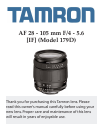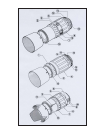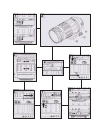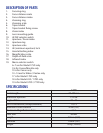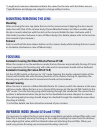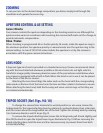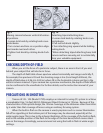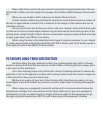
Please refer to the section of your camera's instruction manual pertaining to the use
of the built-in flash, since the angles of coverage of the flashes differ between camera mod-
els.
When you use a built-in flash, make sure to detach the lens hood.
Certain camera models may indicate the maximum and minimum aperture values of
the lens in approximate numbers.This is inherent to the design of the camera and not an
indication of error.
Do not use the lens hood when you shoot with your camera's built-in flash. Even with-
out the lens hood, an arched-shape shadow may be observed at the bottom portion of the
picture when using the built-in flash. Tamron recommends using an optional flash unit (clip-
on grip type) when use of flash is necessary.
When using the lens in the telephoto focal range, it may be necessary to use a tripod
to avoid camera shake. Using high-speed film (ISO 400 or faster) with a fast shutter speed is
also helpful to reduce the effect of camera shake.
TO ENSURE LONG-TERM SATISFACTION
Avoid touching the glass element surface. Use a photographic lens cloth or blower
brush to remove dust from the lens element surface. When not using the lens, always place
a lens cap on it for protection.
Use a lens cleaning tissue or lint cloth with a drop of cleaning solution to remove fin-
gerprints or dirt on the glass lens surface with a rotary motion from the center to edge. Use
a silicon cloth to clean your lens barrel only.
Mildew is an enemy of your lens. Clean the lens after shooting near water or in any
humid place. If you find mildew on your lens, consult a repair shop or nearby photographic
store.
When using your equipment [camera(s) and lens(es)] in an environment where the
temperature changes from one extreme to the other, make sure to put your equipment
temporarily in a case or plastic bag for a length of time in order for the equipment to go
through a gradual temperature shift. This will reduce potential equipment troubles.



